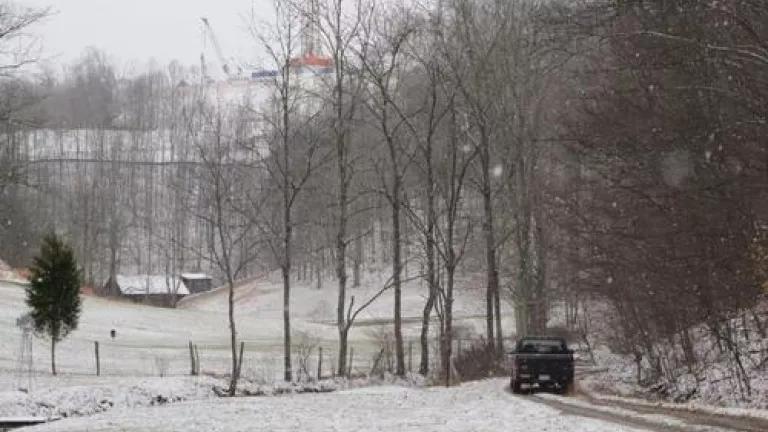
Photo added on July 10
Earlier this year, a few NRDC colleages and I took a field trip to visit some fracking communities in West Virginia. We visit communities around the country periodically to see the affects of fracking first hand. One of the sites we viewed, by standing outside the fence line on a neighbor's property, exploded over the weekend. Apparently, the fracking flowback (the used fracking fluid that has come out of the well during fracking) being injected into holding tanks somehow exploded, perhaps due to a pump malfunction. The explosion is still being investigated.
Reports vary about the number of injured but I've read that five workers had to be evacuated by air to a burn center and three or four others were reported to be treated locally. The wife of one of the burned workers reported that he had not been home from work in more than 40 hours. She also referred to intimidating work environments for workers who have concerns about safety issues: "....you don't ask questions," she said. "Not if you want your job."
Three volunteer fire departments were on the site starting around 4:00 a.m. Do volunteer fire departments really have the resources needed to fight these large industrial fires? Below is a photo of the wellpad where the explosion took place (taken in January). You can see how close it is to people's homes:
Photo credit: Rocky Kistner/NRDC
And is anyone protecting the workers? OSHA can't inspect every site, and even when OSHA is on the case, the fines are much too low. Just today an article reported OSHA proposed fines in Colorado for safety violations--the fines were only $10,200 and $7,854 for violations like not telling a worker he was dealing with hazardous chemicals--something that could have led to serious injury or even death.
In 2011, a West Virginia worker was killed and the fine was $4,900. That's it. According to a very disturbing EnergyWire report, his employer (a different company than the one mentioned above) cut corners to save money by foregoing important pallets needed to stabilize the work site, by allowing someone without proper training to operate equipment, and by trying to speed up work.
EnergyWire reported that oil and gas sites are among the most dangerous workplaces in the country.
The company that owns the well where the tanks exploded the other day has been cited for 17 violations of state code in the past three years. Last year, a well fire injured three workers. Other citations have been for contaminating streams and other environmental violations.
The federal and state governments need to crack down on companies that are violating the law and that are placing workers in harm's way. Without stiff enforcement and truly meaningful penalties, including shutting down serious violators and fines high enough to incentivize change in business practice, the public will never have faith in the ability or commitment of regulators to protect human health and the environment, or any confidence that companies will clean up their act.

